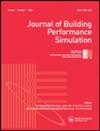RBFMOpt、NSGA2和MHACO在某办公楼热能源优化中的性能评价
IF 2.3
4区 工程技术
Q2 CONSTRUCTION & BUILDING TECHNOLOGY
引用次数: 1
摘要
基于仿真的优化过程(SBO)是寻找高效建筑的一种有价值的方法。本研究评估了面对相同SBO问题的多目标算法RBFMOpt、NSGA2和MHACO的性能。目标是最大限度地提高热舒适性,同时最大限度地减少典型巴西办公大楼的暖通空调系统的能耗。我们提出了一种基于四种算法性能指标的评分方法:hypervolume, variability, IGD+和coverage。我们还应用了Kruskal-Wallis测试来确定SBO过程是否需要多次运行才能获得每个算法的平均性能。结果表明,RBFMOpt在仿真和优化过程预算较低的情况下表现出最好的性能,获得了较高的分数。结果还指出,RBFMOpt的循环次数直接影响溶液的质量,循环次数越多,效果越好。本文章由计算机程序翻译,如有差异,请以英文原文为准。
Performance assessment of RBFMOpt, NSGA2, and MHACO on the thermal and energy optimization of an office building
Simulation-based Optimization processes (SBO) can be valuable methods in searching for efficient buildings. This study evaluates the performance of the multi-objective algorithms RBFMOpt, NSGA2, and MHACO facing the same SBO problem. The goal is to maximize thermal comfort while minimizing the energy consumption with HVAC systems for a typical Brazilian office building. We proposed a scoring method based on four algorithms’ performance metrics: hypervolume, variability, IGD+, and coverage. We also applied a Kruskal–Wallis test to determine whether the SBO process needs multiple runs to obtain the average performance of each algorithm. The results show that RBFMOpt presents the best performance, reaching a higher score, especially in situations with low budgets for the simulation and optimization process. The results also pointed out that the number of cycles for RBFMOpt impacts directly the quality of solutions, and a higher number of cycles provided better results.
求助全文
通过发布文献求助,成功后即可免费获取论文全文。
去求助
来源期刊

Journal of Building Performance Simulation
CONSTRUCTION & BUILDING TECHNOLOGY-
CiteScore
5.50
自引率
12.00%
发文量
55
审稿时长
12 months
期刊介绍:
The Journal of Building Performance Simulation (JBPS) aims to make a substantial and lasting contribution to the international building community by supporting our authors and the high-quality, original research they submit. The journal also offers a forum for original review papers and researched case studies
We welcome building performance simulation contributions that explore the following topics related to buildings and communities:
-Theoretical aspects related to modelling and simulating the physical processes (thermal, air flow, moisture, lighting, acoustics).
-Theoretical aspects related to modelling and simulating conventional and innovative energy conversion, storage, distribution, and control systems.
-Theoretical aspects related to occupants, weather data, and other boundary conditions.
-Methods and algorithms for optimizing the performance of buildings and communities and the systems which service them, including interaction with the electrical grid.
-Uncertainty, sensitivity analysis, and calibration.
-Methods and algorithms for validating models and for verifying solution methods and tools.
-Development and validation of controls-oriented models that are appropriate for model predictive control and/or automated fault detection and diagnostics.
-Techniques for educating and training tool users.
-Software development techniques and interoperability issues with direct applicability to building performance simulation.
-Case studies involving the application of building performance simulation for any stage of the design, construction, commissioning, operation, or management of buildings and the systems which service them are welcomed if they include validation or aspects that make a novel contribution to the knowledge base.
 求助内容:
求助内容: 应助结果提醒方式:
应助结果提醒方式:


